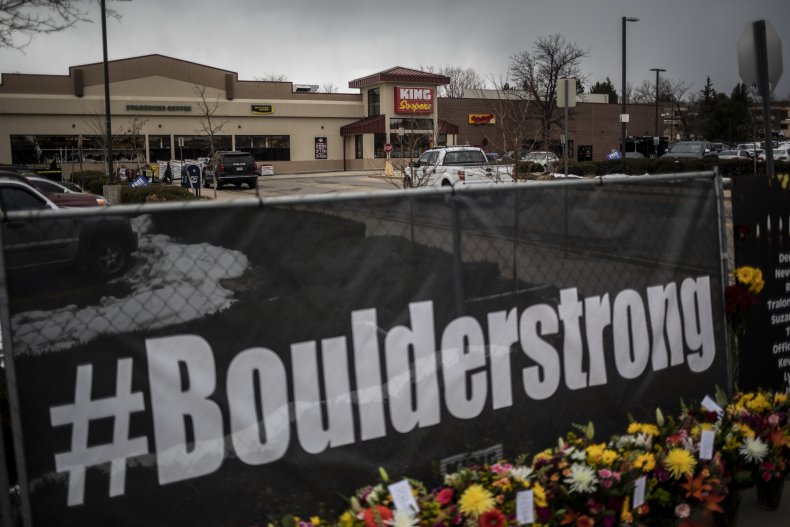There's a Way to Reduce Mass Shootings That Left and Right Can Agree On | Opinion
Two tragic mass shootings in the last week, first in Atlanta, Georgia then in Boulder, Colorado, have shocked the nation—and forced us into our familiar partisan camps in the debate over gun control.
Democrats like President Biden have responded to the tragedies by renewing their calls to ban vaguely-defined "assault weapons," arguing that weapons of war, like the AR-15 used in the Boulder shooting, have no place among civilians.
Conservative critics, like myself, have pushed back, citing studies showing that past "assault weapon" bans had little to no impact on gun violence, though they did disarm law-abiding Americans.
Regardless of which side you come down on, the simple political reality of a razor-thin Democratic Senate majority, coupled with the filibuster and a conservative-majority Supreme Court, make it extremely unlikely such a ban will become (or remain) law any time soon.
Yet Americans of all political stripes agree that addressing violent crime remains of the utmost importance.
What if there was a way we could significantly reduce the number of mass shootings without either side having to sacrifice their policy principles?
Right now, many political and media figures on both sides of the ideological divide widely advertise shooters' names, faces, and stories to make partisan points. In the Atlanta shooting, many liberal commentators and elected officials were quick to emphasize the shooter's purported motivations and sear his name into our collective consciousness in order to advance their narrative about white supremacy and white supremacist violence. Meanwhile, reckless conservative commentators have blasted the Boulder shooter's Middle Eastern-sounding name all over headlines and social media in order to make cheap shots about Muslim terrorism and immigration.
But this isn't just gross political brinksmanship in the midst of tragedy. It's not just ensuring that we don't find a solution that works for everyone. It's actually exacerbating the problem.
We could meaningfully decrease gun violence if both sides were simply willing to give up their cheap rhetoric. How do I know this? Because according to the American Psychological Association, the individuals who become mass shooters are often directly seeking the media infamy we continue to grant them.
Western New Mexico University Psychologist Jennifer B. Johnston has found in her research that mass shooters tend to be in the midst of rampant depression, social isolation, and pathological narcissism; they are in part driven to such heinous crime by their desire for national attention.
And it is undeniable that the wall-to-wall coverage in the wake of these mass shootings—coverage that is amplified and jacked up by partisan political attacks that instrumentalize the shooters' names and identities—makes the crime all the more tantalizing for these mass murderers.
"We find that a cross-cutting trait among many profiles of mass shooters is desire for fame in correspondence to the emergence of widespread 24-hour news coverage on cable news programs, and the rise of the internet," Johnston has said. "If the mass media and social media enthusiasts make a pact to no longer share, reproduce or retweet the names, faces, detailed histories or long-winded statements of killers, we could see a dramatic reduction in mass shootings in one to two years."
Indeed, Johnston's research has concluded that a collective move to de-emphasize coverage of shooters could reduce mass shootings by at least one-third.
This isn't an outlier finding. A letter signed by 140 experts after the horrific 2017 Las Vegas shooting unanimously echoed the same point: Reducing coverage and infamy of shooters will reduce future shootings.

"As scholars, professors, and law enforcement professionals, we do not agree on everything," they wrote. "Some of us believe that by denying mass shooters fame, we would deter some future fame-seekers from attacking. Some of us believe that by no longer creating de facto celebrities out of killers, we would reduce contagion and copycat effects. Some of us believe that by no longer rewarding the deadliest offenders with the most personal attention, we would reduce the competition among them to maximize victim fatalities."
"However, all of us agree that it is important to stop giving fame-seeking mass shooters the personal attention they want," the letter concludes.
The takeaway here is clear: We could save countless lives, without anyone's rights being infringed or either side having to compromise intractable policy positions. All it would take is for liberals and conservatives alike to be willing to sacrifice the opportunity to immortalize mass shooters to make cheap partisan points.
That really shouldn't be too much to ask.
Brad Polumbo (@Brad_Polumbo) is an editor at the Foundation for Economic Education.
The views in this article are the writer's own.


